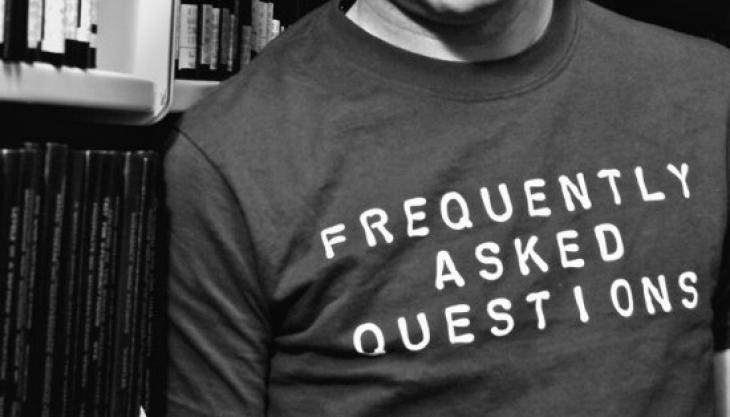10 FAQs on North Carolina Bankruptcy – And the Answers You Need
Submitted by Rachel R on Thu, 09/24/2015 - 12:02pm

FAQs about bankruptcy
Image Source: Flickr User Taber Andrew Bain
What we find when we talk to clients who come in for a North Carolina bankruptcy consultation is that they don’t have an in-depth understanding of what bankruptcy means. They're not clear about what happens during the bankruptcy, how the process goes, and how they can get the best results from bankruptcy. Today we address 10 of the most frequently asked questions we hear and offer answers you need to educate you on how bankruptcy might benefit you.
#1 How long does bankruptcy take?
Chapter 7 bankruptcy, the most complete form of bankruptcy, is a fast process, and there's usually three to four months between filing and discharge. Chapter 13 bankruptcy is a longer process and involves a three to five-year payment plan before a discharge will be issued.
#2 Will bankruptcy stop debt collectors?
Yes – in their tracks. It is against the law for debt collectors to contact you from the moment your bankruptcy petition is filed and during the automatic stay that lasts roughly 90 days. From there, any debts rolled up in your bankruptcy are also off limits for debt collectors.
#3 Is bankruptcy expensive?
Bankruptcy fees are very reasonable and usually much more affordable than the interest, penalties and finance charges you will face by continuing to be deep in debt. Your attorney fees can often be rolled up in the repayment plan on Chapter 13 and are less costly on Chapter 7.
#4 Do I have to file bankruptcy with my spouse?
No. If you are married, you have the choice of filing bankruptcy as an individual or as a couple however both your incomes will be considered on the Means Test if you’re considering Chapter 7. And in Chapter 13, your spouse’s income will affect your payment plan.
#5 Will I have to go to court as part of my bankruptcy?
Yes, you will have to go to court, but it’s nothing to worry about overmuch. When you go into court, the focus is not solely on you. There are several other cases going through the process at the same time. You will be asked a few questions and you’re done – no big drama or ordeal.
#6 Will bankruptcy stop foreclosure on my home?
Yes. Bankruptcy stops both repossession of a car or foreclosure on your home. If you’re behind on payments, Chapter 13 can allow you time to get caught up on what you owe. Chapter 7 can give you time to save up for a rental home so you can afford to move.
#7 Can I keep some debts out of my bankruptcy?
You cannot pick and choose which debts will be in your bankruptcy – they will all be part of your petition. However, you can usually keep a mortgage or car loan active during and after your bankruptcy process if you choose and if you can afford to service the debt.
#8 What debts can be wiped out in bankruptcy?
Unsecured debts such as credit cards, medical bills, old utility balances, HOA fees, and personal loans can be discharged. If you have past-due income taxes older than two years, these may also be dischargeable. In Chapter 13, you will pay part of these debts, with Chapter 7, likely none.
#9 Will bankruptcy ruin my credit?
Your credit is probably already suffering if you are behind on your bills. Every month that a bill goes unpaid, or you’re maxed out on credit cards will see your score continue to drop. Bankruptcy can, in fact, help you improve your credit score by freeing up your cash and clearing out old debts.
#10 Do I make too much to file bankruptcy?
A Chapter 13 is open to anyone with the income to afford a repayment plan. With a Chapter 7, you can also earn any amount and still qualify so long as your debts greatly outweigh your ability to pay. Most income situations qualify for one bankruptcy chapter or the other.
The above is just a sampling of the questions we hear from potential clients but, if you’re considering bankruptcy, you likely have many questions of your own. Call +1-833-627-0115 today to talk to one of the North Carolina bankruptcy experts at the Law Offices of John T. Orcutt. We have offices in Raleigh, Durham, Fayetteville, Wilson, Greensboro or Wilmington and offer free a bankruptcy consultation to all new clients.
Debts Hurt! Got debt? Need help? Get started below!
Serving All of North Carolina
- Bankruptcy Attorneys Raleigh NC (North)
- Bankruptcy Attorney Fayetteville NC
- Bankruptcy Attorney Durham NC
- Bankruptcy Attorneys Wilson NC
- Bankruptcy Attorneys Greensboro NC
- Bankruptcy Attorneys Southport NC
- Bankruptcy Attorneys Wilmington NC
Bankruptcy Attorneys Raleigh NC (North)
6616 Six Forks Rd #203 Raleigh, NC 27615 North Carolina
Tel: (919) 847-9750

Bankruptcy Attorney Fayetteville NC
2711 Breezewood Ave Fayetteville, NC 28303 North Carolina
Tel: (910) 323-2972

Bankruptcy Attorney Durham NC
1738 Hillandale Rd Suite D Durham, NC 27705 North Carolina
Tel: (919) 286-1695


Bankruptcy Attorneys Greensboro NC
2100 W Cornwallis Dr. STE O Greensboro, NC 27408 North Carolina
Tel: (336) 542-5993

Bankruptcy Attorneys Southport NC
116 N Howe St. Suite A, Southport, NC 28461 North Carolina
Tel: (910) 218-8682

Bankruptcy Attorneys Wilmington NC
116 N. Howe Street, Suite A Southport, NC 28461 North Carolina
Tel: (910) 447-2987
